Supernatural Psychology: Exclusive Interview and Fandom Chat
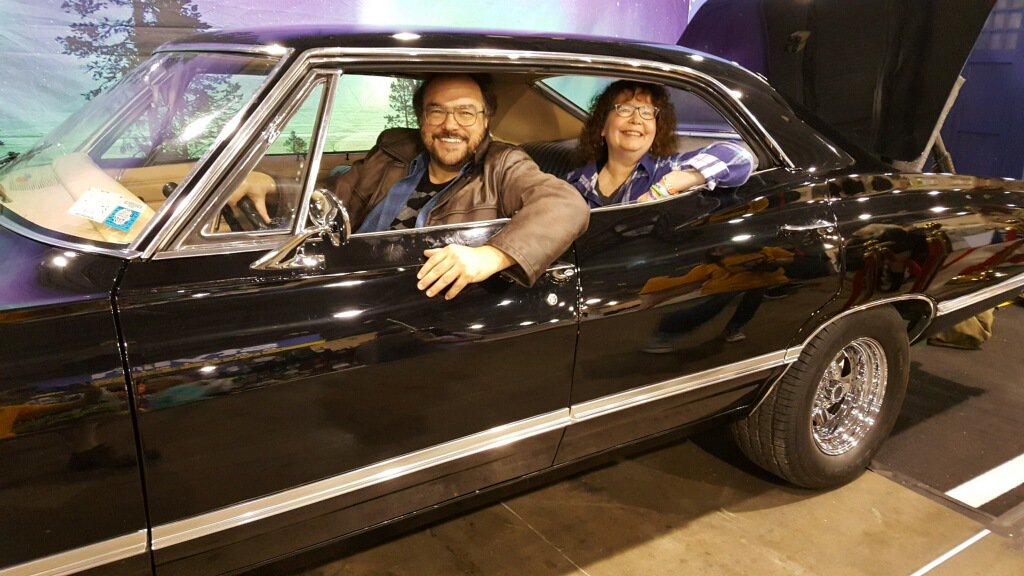
What happens when two psychologists get together to analyze Supernatural, in all its complex, co-dependent, traumatizing glory? A new book is written on the subject, of course! In November of 2017, Supernatural Psychology: Roads Less Traveled was released by Sterling Publishing, the originator of the Popular Culture Psychology series of books. The book is the joint project of Dr. Travis Langely, the editor of at least eleven other popular culture psychology books, and Dr. Lynn Zubernis, co-author/editor of four books on Supernatural and a list of other books on psychology and fandoms.
I sat down with Travis and Lynn in July of 2017 to talk about what Supernatural fans should expect from Supernatural Psychology. The conversation that resulted was more a stream-of-consciousness discussion between three fans about the psychology of the show and its characters than a formal interview about a soon to be released book! I share with you the audio recording of our talk so you can hear our enthusiastic love of the show for yourselves, if you’ll pardon the background noise (we met during San Diego Comic-Con and private rooms there are non-existent) and our frequently simultaneous remarks that take talking over each other to an art form! We’ve also transcribed the chat if you prefer reading to listening.
This interview took place between seasons 12 and 13 in the context of the show.
NIGHTSKY: Thank you both for coming. To introduce myself, I represent The Winchester Family Business website.
TRAVIS: It’s [a] good website! I like it.
NIGHTSKY: You know it!
TRAVIS: Yeah.
NIGHTSKY: Oh good.
TRAVIS: Oh yeah. We’re writing about Supernatural. We’ve got to know all kinds of things Supernatural.
NIGHTSKY: Right?
TRAVIS: I like that website.
NIGHTSKY: Excellent! I’m the managing editor. I’m the one that’s always on all the social media for our accounts and handle every article that goes out, in one way or another.
TRAVIS: Actually, I cited a couple of articles that appeared on your site. I don’t remember why, but I do remember citing some things from that website.
LYNN: Yeah… Supernatural Psychology, right? Yeah.
NIGHTSKY: Excellent.
TRAVIS: We talked about the fandom some in this one in a way we hadn’t in the previous books. Fandom is part of Supernatural, even within the fiction.
LYNN: Yes, it’s in the canon.
NIGHTSKY: Right.
TRAVIS: My editor had asked if we could do a chapter on fan psychology, I was like, we hadn’t done that before. I was gonna do that with someone else but once Lynn was on board, she was the obvious person to do the fan [chapter]. But it comes up in other places in the book too.
LYNN: It does, yeah.
NIGHTSKY: What drew you to Supernatural as the next show to do in your psychology book series?
TRAVIS: Well, I’ve wanted to cover Supernatural for a long time because I just love Supernatural. When we choose any of the topics, it starts with “what’s interesting to me?” and the other people who will contribute to the books, and then what can we convince the publisher to let us do. And with Supernatural – my previous editor had not been as sure. She thought – she kept saying, “By the time we do the book, the series might end.” I was like, “It goes on and on.”
LYNN and NIGHTSKY:(Laughing) She doesn’t understand!
TRAVIS: She thought it was… she loves the show but she thought it was a bit niche. It’s like, “So what, if it’s an enthusiastic niche too?”
LYNN: Yes. And a passionate book-buying niche.
TRAVIS: But with my current editor, she, a publicist, and I were having lunch a year ago, and I said I wanted to cover Supernatural and I want to cover some of these other things, and in that conversation, we picked three of the upcoming books. So I finally get to do Supernatural!
NIGHTSKY So you’re a fan?
TRAVIS: Oh, yes.
NIGHTSKY: When did you start watching?
TRAVIS: Ah, it was a couple seasons in, and I don’t really remember the first episode I saw, because as soon as I saw it (and really I just caught a little bit of the relationship between the brothers), it was intriguing to me. I then binged on everything after that point. So, roughly, my first episode was the first three years.
NIGHTSKY: Which is fair!
LYNN: Which is sort of exactly what I did. I watched it from the beginning just because a friend of mine really liked it, so I’d sort of watch it every week just so that we could have a little chat about it, but it didn’t grab me. And then, early on in season two, I was sitting there watching it, and suddenly I was like – I was grading papers and suddenly the papers literally slid off my lap onto the floor and I was like, “This is the best show!” It was this scene between the brothers, and one of the early, emotional scenes, and I was like, “Wait, why have I not been paying attention to this show?” I went back, got the DVD set, and watched all of season one in a completely different way, and then never looked back.
NIGHTSKY: Well, you mentioned you study fandom in your book. What other aspects of Supernatural are you going to look at in the book?
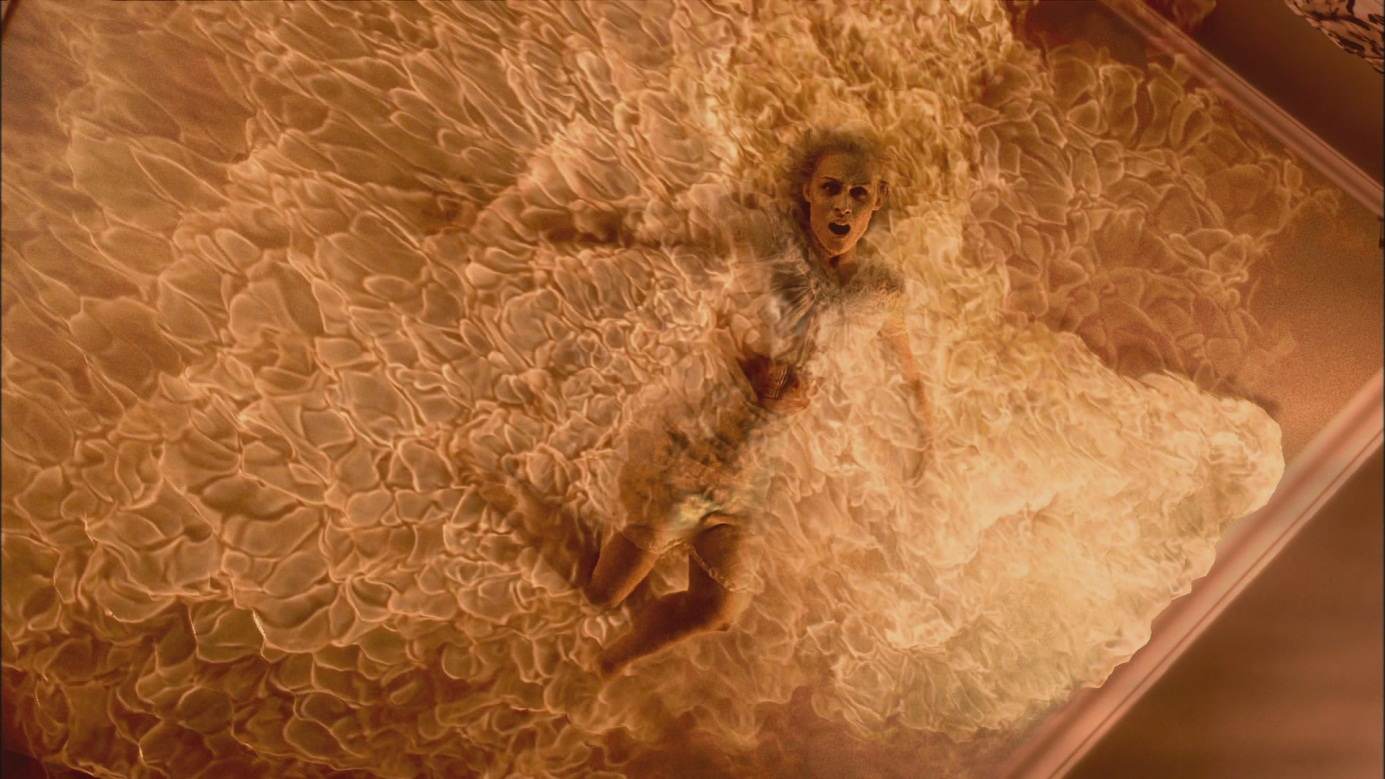
TRAVIS: Well, for the most part, with these books, we’re usually talking about the fiction, the psychology of the stories, and the characters, as a way of talking about real psychology. To some people, it sounds frivolous. You’re analyzing these fictional characters. They’re not real. Yes, but you can often talk about real people, real human nature, more bluntly with fiction. When I teach my forensics psychology class, some of that subject matter’s so unpleasant that the students will miss what I’m talking about. I can talk about some of the same things we know about people who’ve lost family members to crime. Their [Sam and Dean’s] mother gets murdered by someone! That is analogous to some things that happen in the real world. Not a demon and a fire on the ceiling, but that is analogous to some things that happen in the real world. And when I talk about the real victims, it’s a very hard topic. Especially for children who’ve lost their parents. Because I wrote a book on Batman, I’ve dealt a lot with the psychology of children who’ve lost their parents. But when you go through this fictional example, they stay with it and they think about it. People pull what they know about human nature when they’re reading a story, when they’re watching a story, when they go, “That doesn’t make any sense why that character’s doing that.” They’re judging based on what they think about people. And so we can talk about real people, real human nature, through these characters. And with Supernatural, which seems kind of ironic to me, for it being all the demons and the magic, in some ways is the most fantastic subject matter of any of the books I’ve worked on.
LYNN: And yet . . .
TRAVIS: And yet, I feel this one is the one most grounded in our world.
LYNN: Yeah.
TRAVIS: ‘cause they’re in our world. They’re in a dark side of what feels like our world.
LYNN: And they’re written so well that I think the problems that they face and the way[s] that they deal with them come off as really genuine and really human, so people can project onto them even though they’re fictional characters, and they can do it in kind of a safe way because it’s something—it’s displaced. You know, it’s not talking about somebody’s real parent who died, so you can go there because it’s fiction; you have a little bit of distance psychologically and then you can sort of deal with some of your own stuff, and some of the real dark things that have happened to you.
TRAVIS: When you look at groups, racial groups, you know, some group that’s being mistreated in the country they’re in. Well, obviously you’re gonna feel for the ones who are being mistreated and hounded because of things that happened with their ancestors. Maybe their ancestors really did some horrible things, but they didn’t. Now you look at the werewolves in Supernatural. They’re not all doing terrible things, and this is something the Winchesters had to learn, and they’ve been teaching it to others, and it gets you thinking.
NIGHTSKY: …Without being too on the nose about it.
TRAVIS: Without being too on the nose.
LYNN: Usually, usually they’re not too on the nose. Occasionally, they’re a little malicious.
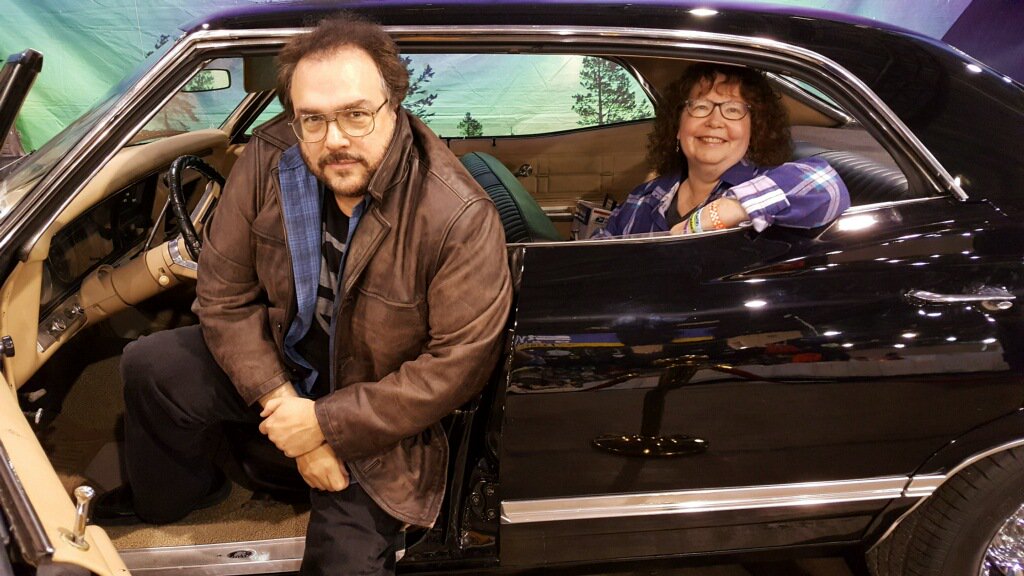
[Tangent Alert!] TRAVIS: It’s not as heavy-handed as Star Trek would be.
LYNN: No.
TRAVIS: Had to be. They were bringing up issues at a very chaotic time. They were bringing up issues that nobody else was talking about on television.
LYNN: And people weren’t expecting them to be talked about. So that had to be a little more…
TRAVIS: And they could do it with the alien races.
LYNN: Yeah.
TRAVIS: And here’s, this one’s half-black on that side, and that one’s half-black on the other side. And yet they’re dealing very much—
LYNN: Not too subtle, but.
TRAVIS: Not subtle, but no real world group in them. With this, we are dealing with people in our world, well, with the werewolves. Some of the monster groups—they’ve never been human, even though they look human—
LYNN: No, no.
TRAVIS: And you still learn, it’s like, well they’re not all bad.
LYNN: That whole shades of grey thing they deal with.
TRAVIS: And they really got into that with the fight over the British Men of Letters.
LYNN: Oh yeah, yeah, yeah.
NIGHTSKY: Well, speaking of the characters then, for example, would you look at Sam and Dean?If you ignore all of their supernatural experiences—they’ve been to Heaven, they’ve been to Hell, they’ve died, they’ve come back—okay, that’s all resurrection, that all is, you know, supernatural. But they also were abandoned and grew up largely without parents, without a secure home. They raised each other. That very much speaks to a lot of situations…
TRAVIS: …A lot of people.
NIGHTSKY: Right. So would you, in the book, look at their situation and say, “Okay, their codependency—the way their arc has gone in the story—is realistic, is believable,” or “No, they’re kinda stretching it because they would never recover or they would have recovered faster,” or, you know, do you look at it from their…
TRAVIS: There’s no right time for recovery. It varies so much. I’ve seen people online saying, “Why is this character, you know, not talking about such-and-such?” Or “Why is this character recovering too quickly?” So, you know everyone is different. Just because they look like they’re recovering quickly doesn’t mean they are.
LYNN: Right.
TRAVIS: [In] several different chapters, writers keep bringing up the parentification of Dean, where the older son was in a parental role having to watch over the younger one. And to the point where I actually had to tell one of my writers, “We have two others who’ve covered parentification so heavily, would you please take it out of your chapter? We’ve got all these other subjects.” The others covered it more heavily and it was more particular to their main point than with this additional one. Because it was so obvious, this thing that happens with a lot of individuals. We’re talking latchkey kids, neglected kids, or kids for a lot of different reasons. But even the Heaven-Hell thing, some of that is comparable to things such as combat veterans returning home from horrible situations.
LYNN: Right. It’s trauma.
TRAVIS: It’s trauma. It’s a different world. It’s hell for them. And they return to this world where other people don’t know what they’ve been through.
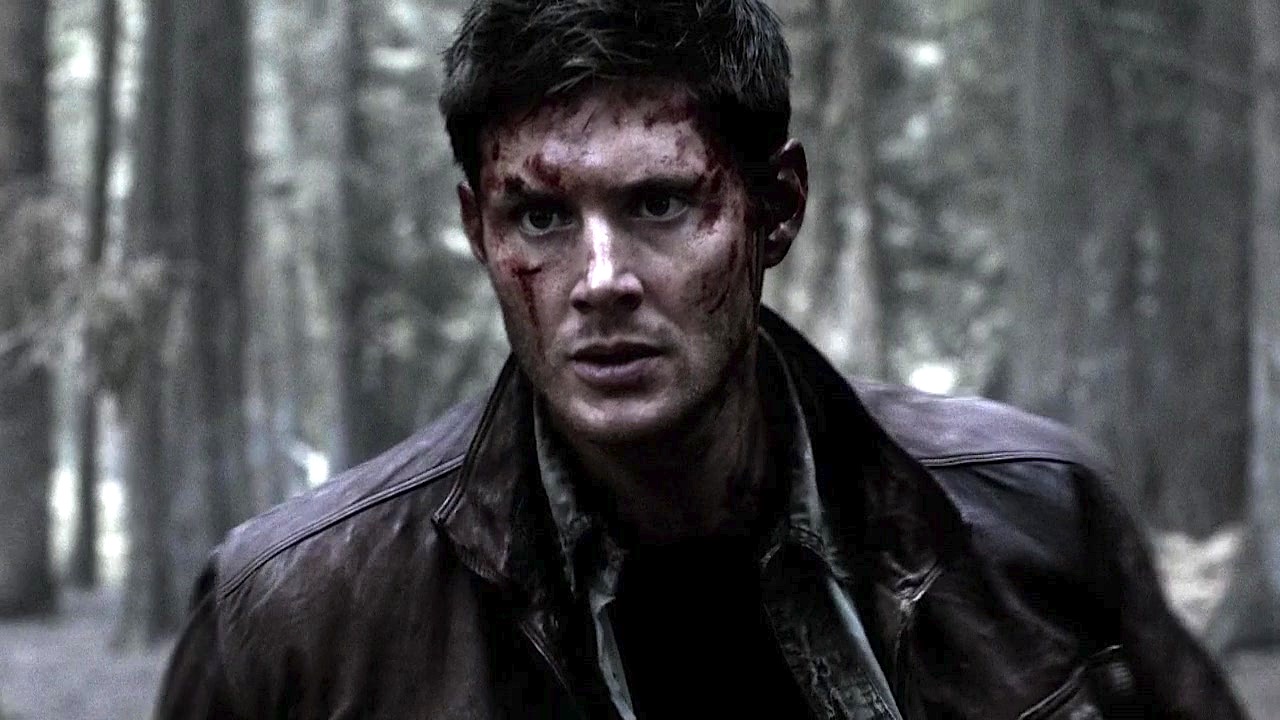
LYNN: Like the Purgatory storyline. It’s a perfect analogy of that.
TRAVIS: That was probably the best one that I can think of.
LYNN: Yes.
NIGHTSKY: Yes, ‘cause fighting for your life on a daily basis.
LYNN: And living in a world that is so different that when you come back, even though it’s a better world that you’re back in, you feel alienated. You’ve changed.
NIGHTSKY: Even the vending machine is too much for you.
LYNN: Exactly.
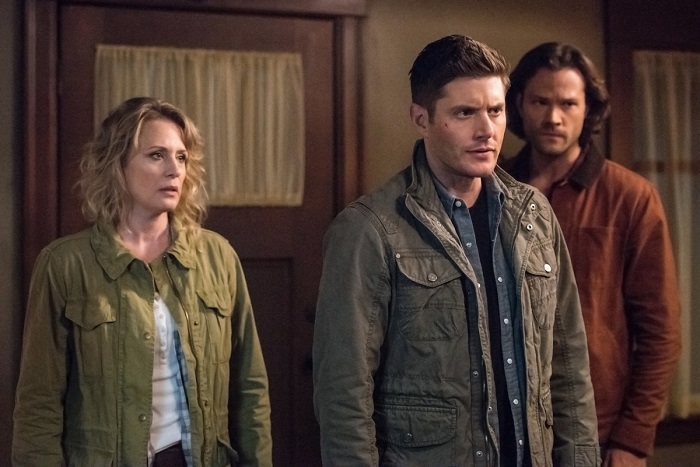
NIGHTSKY: Right. Since you are current on the show, did you touch at all on Mary?
TRAVIS: Yes.
NIGHTSKY: …The fact that, so many hero development stories take the mom out of the equation early on, at an early age, so the heroes are on their own, but this one brought her back.
LYNN: The timing is …one thing
TRAVIS: There’s a lot of [ ?] we chose, obviously, for the book that are in the series.
LYNN: Right, yeah.
[and we digress…] TRAVIS: The thing with Mary, it’s late in the series, late in this season [12] before you know for sure what’s going on in their relationship. Before Dean gets what’s going on in their relationship.
LYNN: …Really the very end of the season before he gets it.
TRAVIS: And one of our… at the beginning of every chapter we have quotes—a fiction quote and a real-life quote—that relate to what’s going on in the chapter. A couple of them needed to be replaced and in one of the opening epigraphs, I replaced (with the author’s ok) it with this thing Dean is saying to Mary.
LYNN: Oh, from that last episode?
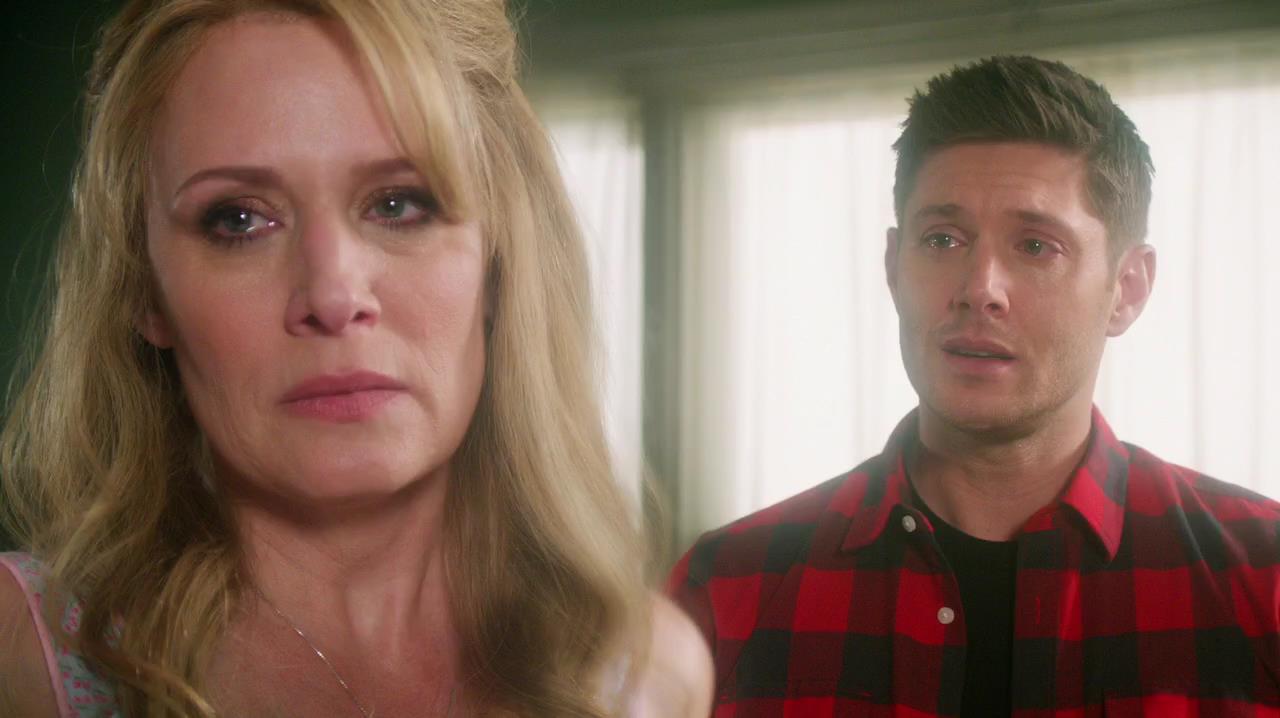
TRAVIS: It’s about how, “I had to be the father and the mother.”
LYNN: Yeah. But he did. He addressed it; he laid it out.
TRAVIS: And, “I wasn’t any good at it and that’s not fair.” And it’s such a wonderful, wonderful quote.
LYNN: Yeah, “I hate you, but I love you.”
TRAVIS: And Jensen Ackles has said that that scene helped him understand the whole season.
LYNN: It did, ‘cause he was as lost as many of us were.
NIGHTSKY: Well, it helped everyone understand the whole season.
TRAVIS: But him [Jensen] being lost in the role, also sort of Dean not getting his own reservation.
LYNN: That’s right!
TRAVIS: It worked out in the end.
LYNN: It did! Because Dean felt the same way as Jensen, and Jensen felt the same way as most of us watching, so we were all on the same page.
TRAVIS: It was so wonderful. I cried. I really did.
LYNN: Oh, oh yes. So did I.
TRAVIS: I don’t cry at a lot of TV. I cried at that scene.
LYNN: When Jensen started to cry—
TRAVIS: You know, well, they had in the script that he was supposed to cry. But he said, “If it happens, it happens. You can’t tell me to do that.” But he said, “There I was.”
LYNN: Yep.
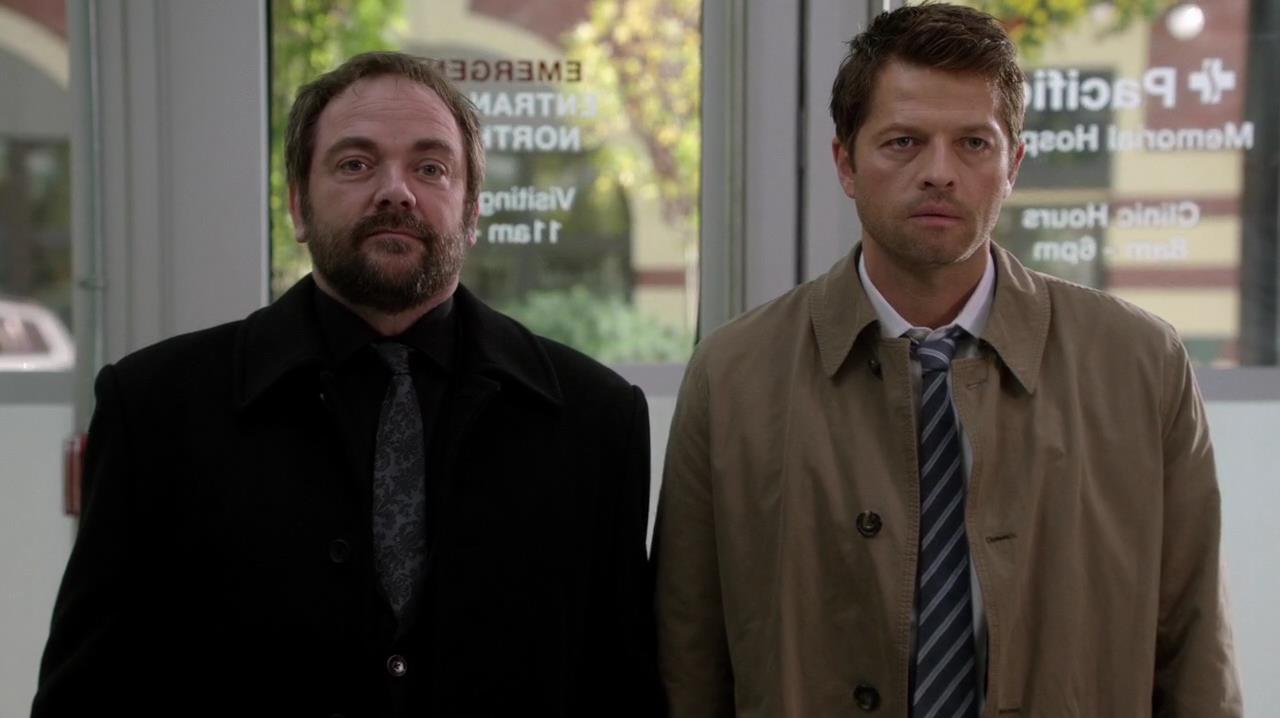
NIGHTSKY: Besides Sam and Dean, do you look at Castiel? He was a soldier and then he became a god, and then he became a human, and—I mean, they’ve taken him all, many…
TRAVIS: With Castiel, some aspects of Castiel’s history are harder to relate to the real world. But, but there are some things. He’s had growth as a person. He’s had changes. Castiel and Crowley we’ve got, especially. There’s a chapter on leadership, looking at Castiel and Crowley.
LYNN: Right. That’s a large part of both of their journey. Castiel, the reluctant leader, and Crowley, the sort of—thinking he really wants it and then being more ambivalent.
TRAVIS: One of the things I noticed when we first went through all these opening epigraphs – I pointed out, “Not one of these opening epigraphs is by a female character. Can we replace them with some…? I want some Charlie in here!” In three different chapters we quote Charlie. We’ve got an interview with Felicia Day that’s part of a chapter.
LYNN: Yeah.
TRAVIS: Oh, and Amanda Tapping, who was Naomi. So we’ve got the two of them. After we interviewed them, I went back through—“How do these logically connect to a specific psychology where they’ll make sense in the same chapter?” It actually works pretty well. Um, looking at the good, the bad… ‘cause with Charlie, we’ve got her good side and her dark side. And Naomi, you have this leader angel, who’s done some horrible things.
LYNN: And yet, also, sort of had a good side as well.
NIGHTSKY: Thought she was doing the right thing. Just took it to extremes.
LYNN: Exactly, exactly. Yeah.
NIGHTSKY: In studying the characters and doing the interviews, even knowing the show, did anything surprise you compared to the studies you’ve done of other shows or in real life? Where you were really surprised how they handled something or a character they put in place?
LYNN: I mean the thing that surprises me all the time—the most about Supernatural—is how much of their own fannish stuff they are willing to reflect in canon. I mean, when you look at all of the meta episodes that they’ve dared to do. They’ve really been gutsy about it. The Ben Edlund episodes, the Robbie Thompson episodes. It’s a rare show. Maybe shows will do [it] one time. They’ve had like seven or eight really-fan episodes.
TRAVIS: But without overdoing it. Without doing it to the point that you give up on the reality of the characters.
LYNN: Yeah, yeah. Seamlessly.
[Tangent Alert, again!] TRAVIS: Like I remember there was a show Moonlighting with Cybill Shepherd and …
LYNN: Yeah, yeah.
TRAVIS: And they got to the point where there was too much meta. You lost some investment in the characters because of that.
LYNN: Right. And they-they sort of jumped the shark. They’ve never done that on Supernatural.
TRAVIS: Supernatural never does the kind of wink-wink where they make a reference to, “We need to go talk to the writers about this episode.”
LYNN: No.
TRAVIS: They don’t do that level of meta.
LYNN: No, no. It’s very subtle.
NIGHTSKY: You have to read into it.
TRAVIS: Linda Blair appears, and at the end he wants some pea soup. It’s like, “Ok.” You-you get it, but… Even when he says she looks familiar. And also, that’s at the end. You can step outside a little at the end.
Lynn: At the very end.
LYNN: Right, ‘cause you haven’t lost the frame throughout.
[tangent of a tangent alert!] TRAVIS: Like, in the Starsky & Hutch movie, when the original Starsky & Hutch show, for the last scene—They don’t destroy the reality of the silly movie… And likewise, with some of the more meta things with Supernatural, they’ll have a joke at the end or, they can do it elsewhere. It’s like “Oh yeah, you know, that world where you were Polish” that they refer to when they did “The French Mistake.”
LYNN: Yes. Or the little like, “Why do they call it Destiel? Shouldn’t it be Dee-stiel?” Like little in-jokes.
TRAVIS: And, and know what? He’s right.
LYNN: I know. I know!
TRAVIS: Why is it pronounced that way?
LYNN: I do not know.

TRAVIS: But that show [“The French Mistake] was about fans. ‘Cause they have fans of their own lives within the show. It’s not just about the fans of the show. It’s about people in real-life who have fans.
LYNN: Right? And then they can comment on that. Which I think is brilliant.
TRAVIS: Yeah. The actors have fans in real-life. These characters have their fans. Who think they’re fictional. Mostly.
LYNN: I mean, it’s very interwoven.
NIGHTSKY: And they do it so well.
LYNN: They do.
NIGHTSKY: And you’re seeing that as very, very different from other shows…?
LYNN: I don’t think anybody’s done it better.
TRAVIS: I can’t think of anybody who’s done it—
LYNN: I can’t either.
TRAVIS: To that degree. As well.
LYNN: Yeah.
TRAVIS: I can’t think of any. And-and that’s why we have a… chapter on fan psychology at the start of the book.
![]()
NIGHTSKY: Which is perfect! I was just going to ask… What do you cover in the chapter on fans?
LYNN: I really try to cover, sort of what is different about this show and why people are so drawn to it. Sort of what fandom—the community of fandom—kind of gives fans. Why this has become such a passionate and influential fandom. They do a ton of charity work. I mean, you know. This is the people who are on your website. It really is-it’s not that other shows don’t have fandoms—they certainly do—but this one is pretty unique in its passion. I mean, it’s kept their show on for thirteen seasons. A little show on the CW, which is pretty impressive.
NIGHTSKY: People have grown up with this show.
LYNN: Yeah. People have.
TRAVIS: And it’s the strength of the characters and the writings. And the people. You know, from show runner on down. Those who are involved with the public are enthusiastic about it. Jared, as he talked about in your book, Family Don’t End with Blood, where she [Lynn] has a lot of cast – chapters by cast members and fans. He talks about what a fan of many things he was growing up.
LYNN: Right. So he really relates.
TRAVIS: He relates to being a fan.
LYNN: Yeah, yeah. And they have all treated the fans with so much respect. There’s been such a nice reciprocal relationship, and it’s also unique in that, this cast does sixteen, seventeen, eighteen conventions a year. So they’ve actually had face-to-face contact with the fans for a decade. So, you know-
TRAVIS: Not talking at them.
LYNN: No
TRAVIS: Talking with them.
LYNN: With them. Yeah.
NIGHTSKY: Getting to know them.
TRAVIS: They go up, and they’re not just repeating the same stories. They do some, but they don’t just repeat the same stories over and over and over.
LYNN: No.
TRAVIS: They’re just getting up and having a conversation. They can go off on tangents that have nothing to do with the show, ‘cause that’s what on their mind that day.
LYNN: Yeah. They just relate as people. And that’s what breaks down stereotypes. So this cast couldn’t hang on to negative stereotypes about fans because they were too busy actually interacting with them…
TRAVIS: There’s this phrase, “parasocial relations,” which some of the early people looking at fans—you bring this up in your chapter—
LYNN: Yeah.
TRAVIS: Some of the early people looking at fan/fandom, a bit negatively. And that phrase makes sense; it’s saying a one-sided social relationship. You’ve got these strong feelings about a character or a show or a celebrity, but it’s not a two-way relationship. But, that’s not accurate for so much of what goes on with Supernatural. It does work both ways. You know, the actor talking with you is genuinely interested in what you’re trying-and they want you to enjoy the moment. Really, they talk to so many people; they’re not going to remember them all, though it is amazing how many they do.
LYNN: They are amazing at that.
TRAVIS: “Oh yeah. I saw you at such-and-such!”
LYNN: Yeah. They are amazing at that.
TRAVIS: Because they’re really into it when they’re doing it or they wouldn’t be forming those memories to be able to say, “Oh, was it Columbus where we crossed-where we saw you in?”
LYNN: Right. And they’re not just objectifying or depersonalizing, or they wouldn’t remember that kind of thing either.
TRAVIS: Yeah.
LYNN: So it is different.
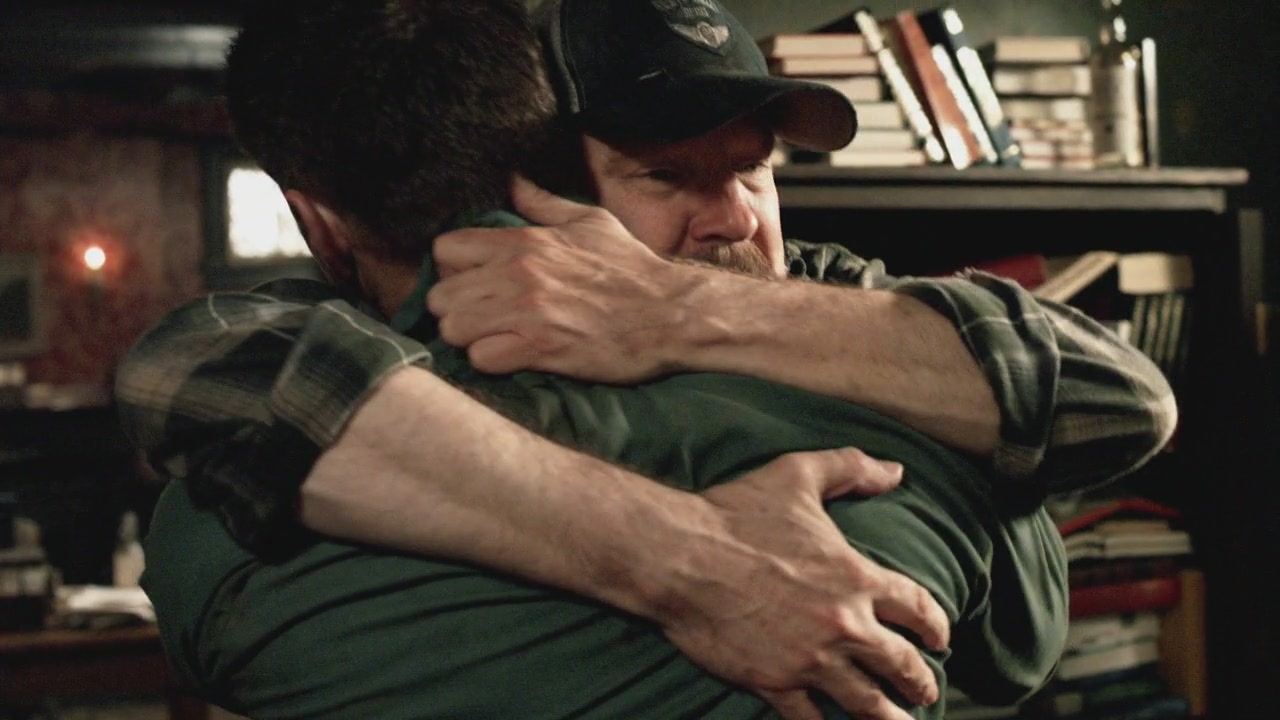
NIGHTSKY: Are there any other chapters that you want to call the readers’ attention [to]? You mentioned leadership, fandom—
TRAVIS: Yeah. We talk about trauma a lot in this book.
LYNN: Yeah.
TRAVIS: Although, really the biggest thing that comes up is family.
LYNN: Mm-hmm.
TRAVIS: The family you choose, the family you’re born into. That’s the biggest theme throughout the entire book. Even when we’re talking about trauma and all these other topics, family keeps getting into every bit of Supernatural.
LYNN: Yeah.
[Here we go again…] TRAVIS: It’s – the relationship between the brothers is the core of it all. But their own sense of family. And Bobby, with his wonderful line about how family don’t end with blood—which Dean then slightly misquotes later on. He got one word wrong.
LYNN: Yeah. I know. Which confuses people all the time. People say, “Why did you call your book Family Don’t End with Blood? Isn’t it “in blood?” No, originally it was “with blood.”
TRAVIS: That’s right. Bobby said “with.” And Dean didn’t remember it perfectly, and you know what?
LYNN: That’s real!
TRAVIS: I like that little touch. That he did not remember it perfectly.
LYNN: Yeah.
NIGHTSKY: Especially given his background, he would think about things “in blood.”
[TRAVIS and LYNN agreeing]
NIGHTSKY: So he added his own experience to his memory.
LYNN: I think that’s a good point.
TRAVIS: That is a good point.
LYNN: I like that. That’s a good explanation for that little subconscious twist. And family even permeates the fandom chapter, because the fandom and the cast together call themselves the “SPNFamily.” So it really is the theme that’s all through the book.
TRAVIS: Later today, we’re doing a panel “Psychology of Cult TV.”
LYNN: 8 p.m.
TRAVIS: And I’m always pointing out that the “cult” part of this is the same root as in “culture.” It’s cult TV if it pulls people together, forming this connection. Whether you’re talking cultural, subcultural, whatever, the connection between the fans is critical. People love Law and Order, but there’s not this bond among the Law and Order fans.
LYNN: Right. So it isn’t life changing. I mean, when I wrote Family Don’t End with Blood, because it’s stories of how this SPNFamily—this whole thing—changed people’s lives: fans and cast. So it’s half written by cast, half written by fans because it’s changed everybody’s life. It’s extraordinary.
NIGHTSKY: It actually became part of their life. As opposed to something—
LYNN: Yeah, yeah. In a way that Law and Order doesn’t. Even though you love it.
NIGHTSKY: Right. That’s entertainment. This is part—you internalize it as part of your life.
LYNN: Yeah. Exactly. And then it impacts identity and longingness and validation and all those important things.
TRAVIS: Right. Which surprises some of the actors, especially those who come on later on. Like Briana saying, “What’s a convention?”
LYNN: “What do you mean change it’s gonna change my life?”
TRAVIS: Laughter.
LYNN: I love that.
TRAVIS: She was told. Because of all of the other actors who immediately knew. She’s sincere. Even on the set, people who come in, they’re just doing one episode; they’re a guest star. They feel welcome.
LYNN: They do.
TRAVIS: They don’t feel like they’re just visiting somebody else’s show. So there’s that atmosphere all along the way in how they’re making the show. And it reflects in the show; it reflects in the fandom. And their own… That has to be a key part of why, you know, these actors are willing to just keep doing this show year after year.
LYNN: It is! It is ’cause it’s their family. They don’t want to give it up either. I mean, yes they get paid for it, but also—
TRAVIS: Turning down movie deals.
LYNN: Yeah. Yeah.
TRAVIS: Jensen, you know, getting scripts for movies someone wants him to do on the hiatus, or read the script. It’s like, “Alright, I look forward to seeing that in theaters.”
NIGHTSKY: Laughter.
LYNN: Yeah.
TRAVIS: ‘cause he doesn’t just want to—they do a lot of conventions, but then, what time he has, he’d rather spent with his wife and kids.
NIGHTSKY: Family.
LYNN: Which is probably a good thing.
TRAVIS: Yeah. And they are so… Love those families. They’re so adorable.
LYNN: The twins. I know. All those kids. They are. They are.
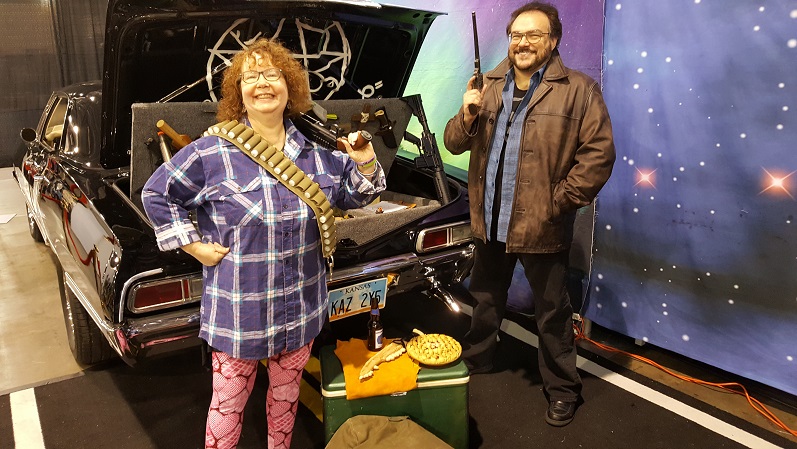
NIGHTSKY: I wondered if there were any topics that you expect the show, or would like to see the show tackle, that it hasn’t yet? Leadership and trauma and family and fandom, abandonment—all those things it has tackled. And you even mentioned discrimination, or stereotypes. Are there any [topics] you’ve seen other franchises tackle, and you’re waiting for Supernatural to get around to? And no, I don’t have any connections with Andrew Dabb but, you know… Maybe he’ll read the article.
TRAVIS: What’s left?
LYNN: It’s hard because they’ve really tackled so incredibly much.
TRAVIS: There are always more stories to tell. The world is full of more stories to tell.
LYNN: Of course, of course.
TRAVIS: Umm, I think we’re gonna get, well especially after those last two episodes [“Who We Are’ and “All Along the Watchtower”], we’re going to be getting back to the brothers and Lucifer Jr. But we’re going to be getting back to the brothers without quite so much other stuff going on—connections. They’re feeling a bit cut off. They’ve lost this support person, that support person, that support person, even the guy from hell.
NIGHTSKY: Crowley.
TRAVIS: Even him. You know, Crowley, sometimes. They’re without this. We have not seen them [just the brothers connecting] since the very beginning.
LYNN: Early seasons. Yeah
TRAVIS: The first season before Bobby has come along. They’re out there. They don’t know other hunters because they’ve been – the way they’ve been raised.
LYNN: John didn’t—
TRAVIS: John kept them away from them.
LYNN: Yeah. So it’s just the two of them.
TRAVIS: I think that reflects some things. You know, people don’t know much about their own culture.
LYNN: Right.
TRAVIS: They don’t know much about their own background.
LYNN: Yeah. Which made them feel even more isolated and that codependence that you talked about. I actually, I will never get tired of them exploring the brothers’ codependence because it fascinates me that it’s both, sometimes a challenge for them, but also a tremendous source of resilience. Which is not how we think of codependence, at all. So, I like that they’re going back to just the two of them against the world. I hope they stick with that for a little bit. I really like them.
TRAVIS: Yeah. Do it for a while. Go there. Stay with this for a little while.
LYNN: If you’re going to do that, if you’re going to traumatize people by killing off so many cast members—
TRAVIS: Yeah, don’t rush into bringing—
LYNN: Let them stay dead for a few episodes so we can explore the impact on Sam and Dean and what that does to their bond, having to lean on just each other again.
[wait for it…] TRAVIS: I look forward to finding out what they’re doing with Mom in the other world.
LYNN: Yeah. Me too. ‘cause she’s back. Sam’s [Samantha Smith] back filming. So—
TRAVIS: And Lucifer’s right there. Yeah, she’s filming. And that’s a bit further along. But, who was it? You know she’s not dead. Effectively, for where they are right now, she’s cut off from them.
LYNN: Yeah, she’s in the other world.
TRAVIS: Just like she was when she was in heaven.
NIGHTSKY: And there isn’t a Sam and Dean—
LYNN: In that world.
NIGHTSKY: In the other world.
LYNN: We know that.
TRAVIS: Sam and Dean do not exist.
NIGHTSKY: So she can be 100 percent hunter. She doesn’t have to get involved in the “Mom role” at all.
LYNN: Right. Yeah. That’ll be interesting.
TRAVIS: She and Bobby will probably team up.
LYNN: I think so.
TRAVIS: They should!
LYNN: I think so. I think everybody thinks so.
NIGHTSKY: Yeah.
TRAVIS: He knew a Mary over there, so—
LYNN: Right.
TRAVIS: So, they-they need to partner up.
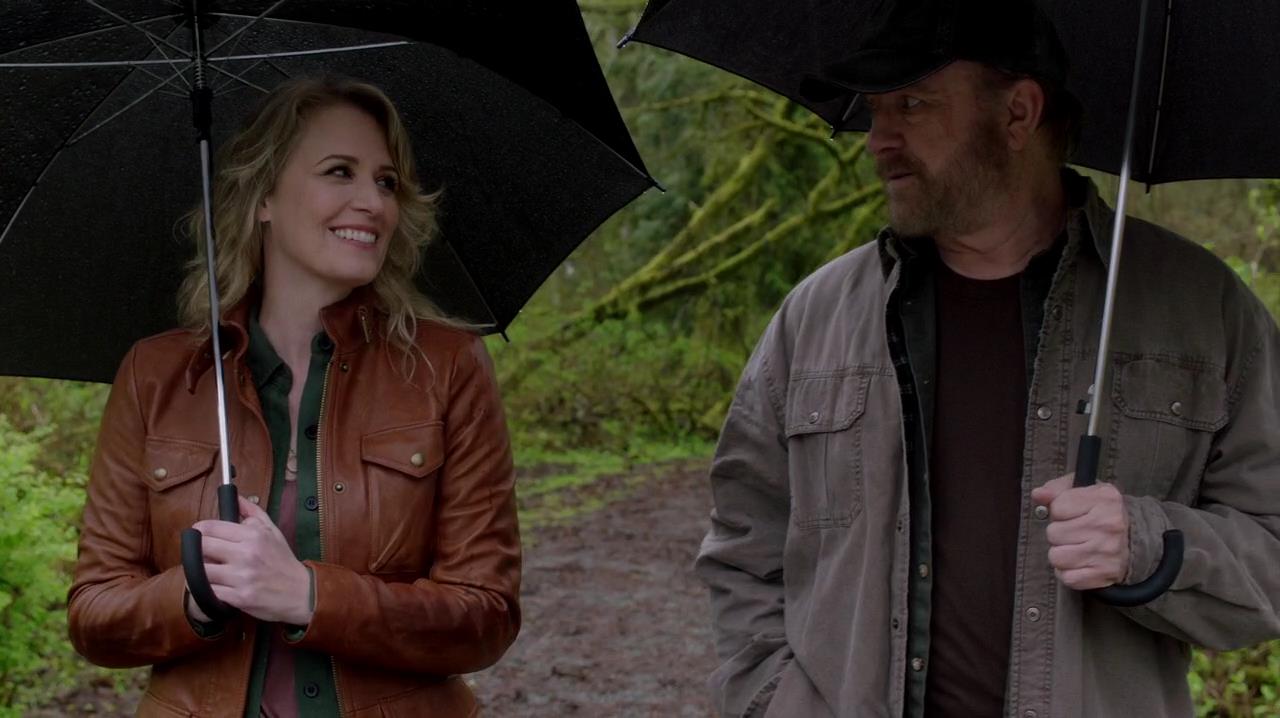
Scene a year later from 13.23 “Let the Good Times Roll”
NIGHTSKY: Oh, just as you said that, I thought, “Oh my gosh, they’re going to do a Bobby/Mary romance.”
LYNN: They might.
TRAVIS: It could happen.
LYNN: I could-I could see it happening.
NIGHTSKY: Wow. Ah, I just, I hadn’t thought of that until you said they’re gonna team up. And I went, “Oh!”
LYNN: What would that be called? Bo-mary?
TRAVIS: Laughter.
NIGHTSKY: Oh.
LYNN: May-obby?
TRAVIS: Barry?
NIGHTSKY: Oh.
LYNN: May-bobby?
NIGHTSKY: Oh, yeah, yeah.
TRAVIS: Mobby?
LYNN: Barry?
NIGHTSKY: We’ll leave that to the fans to come up with.
TRAVIS: Marby?
TRAVIS & LYNN: Laugther.
NIGHTSKY: Oh geez.
TRAVIS: Should we pronounce it this way?
LYNN: I think, I think Jim Beaver would be totally down with that.
NIGHTSKY: Yeah. Me too. I do too!
TRAVIS: I think we’re getting close to something…
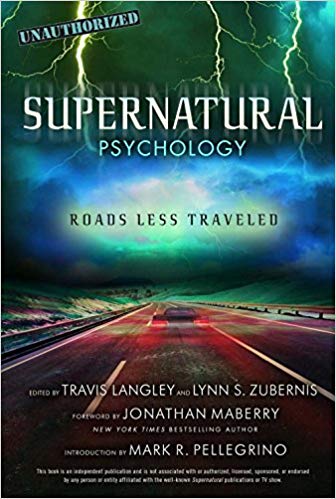
NIGHTSKY: So your book comes out when?
TRAVIS: October is when it’s scheduled for. If it stays on schedule. Um, there are some publishing industry things that could slow it [down].
LYNN: Maybe it’ll be November
TRAVIS: But, but I know my editor’s fighting to try to keep it on schedule to come out in October.
LYNN: Wow.
NIGHTSKY: And it’s called—
TRAVIS: Supernatural Psychology: Roads Less Traveled.
NIGHTSKY: Oh, nice. Very, very nice. Ok, thank you so much!
TRAVIS & LYNN: Thank you.
NIGHTSKY: Good luck with the rest of the day.
LYNN: Thank you.
TRAVIS: It’s nice to meet you. Like I said, I love your website.
NIGHTSKY: Oh gosh! Thank you! I got attracted to it just as a fan. I started reading it and fell in love with it and then I started writing for it. And pretty soon, I was kind of running it.
TRAVIS: Yeah.
NIGHTSKY: So.
LYNN: Laughter. That’s a big thing for you, huh?
NIGHTSKY: Yeah, so be careful what you get involved with. You’d better like it to begin with. Yeah, very good. Thank you!
So that was our informal, formal interview! If in all that talk you didn’t quite pick up what the book’s about, Sterling’s website lists the following as a sampling of topics in Supernatural Psychology‘s 20 chapters:
- The role grief and trauma play in the protagonists’ lives
- The importance of music to the narrative
- What motivates someone to hunt monsters and why we want to believe in magic
- The various archangels and archetypes depicted
- How people can cope with tragedy, loss, addiction, and fear to become heroes who do the right thing
- The dynamics of fandom: how fans relate to the narrative, characters, and actors, and continue to engage with series through fanfic, social media, and other practices
The chapter titles all look fascinating! It’s hard to choose just a few to share with you, but here’s a sampling:
- The SPN Family: The Psychology of Fandom
- Q&A with Felicia Day and Amanda Tapping
- A Trunk Full of Defense Mechanisms
- Lifting the Veil: Effects of Childhood Trauma on the Mind, Body and Soul
- Hunting for Identity
- Bro Moments: Communication between Men
- The Family Addiction: Saving Pople, Hunting Things
- The Message is in the Music: The Psychological Impact of Music in Supernatural
If you have read the book, please let us know your thoughts on it! Favorite chapters? Surprising conclusions? Are there aspects of the show that you’re curious about that book didn’t address? Ask your questions and I’ll see if we can get Travis or Lynn to respond!
Dr. Travis Langely is a psychology professor at Henderson State University, the author of Batman and Psychology (Wiley), and the editor of the Popular Culture Psychology book series. Travis’ Twitter ID is @superherologist.
Dr. Lynn Zubernis is a psychology professor at Westchester University. Lynn is the co-author and/or editor of Fangasm: Supernatural Fangirls, Family Don’t End With Blood: Cast and Fans on How Supernatural Has Changed Lives, Fan Phenomena: Supernatural, and Fandom at the Crossroads, along with a number of other psychology and fandom books. Lynn’s Twitter ID is @FangasmSPN.
An immense THANK YOU to Travis and Lynn for taking the time to talk with me, and to Chelsea for transcribing this long interview! Pictures of Travis and Lynn were taken with Thor the Impala at Wizard World Philadelphia.



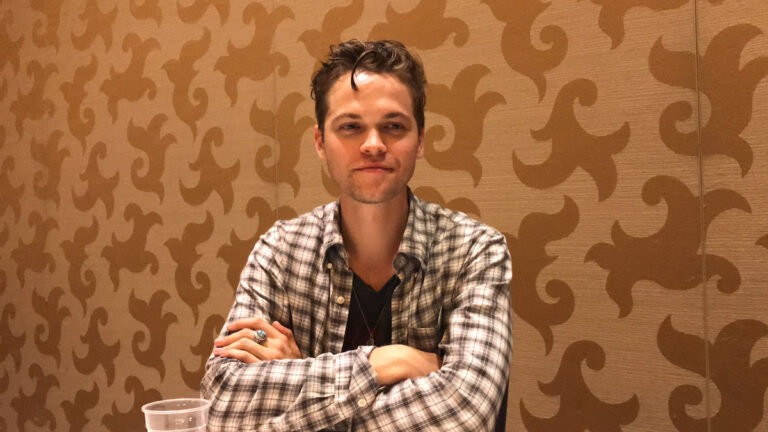

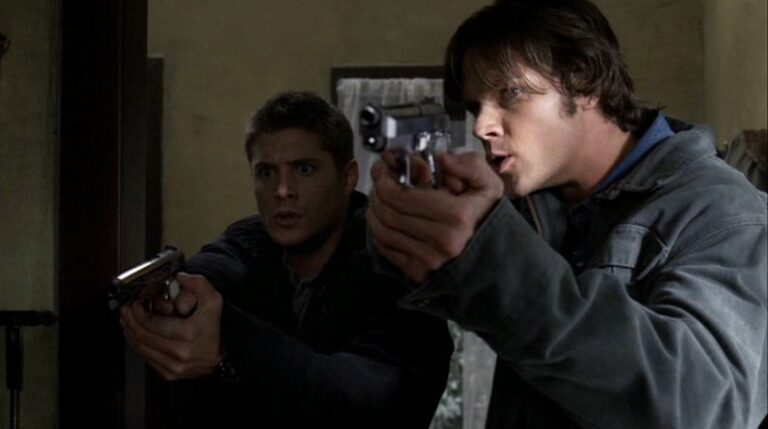
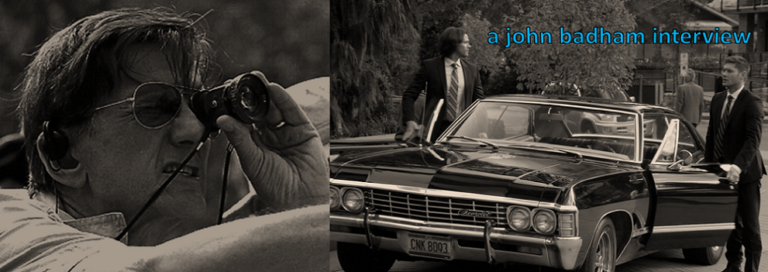
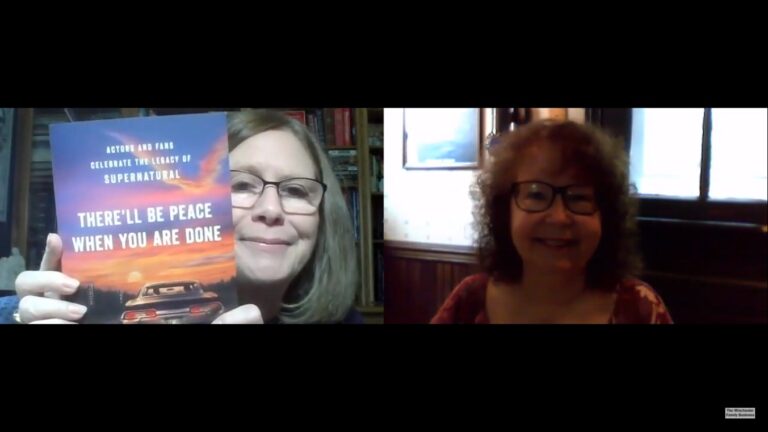
Leave a Reply